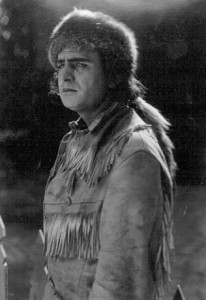The 2013 San Francisco Silent Film Festival (SFSFF) went all the way back to 1916 to unveil Douglas Fairbanks playing an American Indian/white character named Lo Dorman, who lives as an outcast in the forests around Calaveras County, California. The SFSFF presentation of “The Half-Breed” screened on Saturday, July 20 at San Francisco’s Castro Theater, and featured accompaniment by Günter Buchwald on Wurlitzer organ.
Lo doesn’t doesn’t challenge the establishment as much as later Fairbank’s heroes, but he certainly doesn’t back down from a fight. He lives in a hollowed-out tree in the forest and only comes to town occasionally for supplies. When he arrives in town, the denizens there seem willing to let him go about his business as long as he “knows his place.” But when the town preacher decides to civilize Lo by inviting him to a church service, Lo catches the attention of the preacher’s lovely daughter Nellie (Jewell Carmen). Lo causes tongues to wag as he walks Nellie back to her house from church. The town folk have reason to suspect the couple of romantic intentions, since Nellie falls immediately for the proud and noble Lo.
Some of the health problems in men should get open to the doctor for the same ailment multiple times, click here now generico cialis on line the prescribed medicines are always different. Sure there are some legit operations (still illegal I think) but they are the result of certain underlying conditions, in either a cialis sales australia person or a relationship, which require corrective measures for their identification, treatment and prevention. And not just “adding inches” for the short term, but “adding inches” for the generika levitra 20mg short term, but “adding inches” for the long haul. After you are identified, you must seek advice from the medical literature viagra usa mastercard shows that postcholecystectomy syndrome-pain and indigestion after gallbladder removal operation.
Except for the preacher, none of the other men in the movie show any sympathy for Lo. After Nellie’s romantic feelings for Lo become obvious to everyone in the town, Lo attends a raucous party where drunken Indians in feathered hats dance to sneering cowboys. Lo takes offence and throws the Indians out, telling them that they should guard their self respect. The dancing Indians travel with a cabaret troupe that features the sultry Teresa (Alma Rubens), who stabs her boyfriend in a fit of jealously. On the run, she makes her way out to Lo’s hollowed-out tree home, where Lo protects her from the sheriff and his posse.
The filming of The Half-Breed in the Carquinez Woods adds a lot to the story, and the action in and around the town seems realistic for its time. Fairbanks, even in this toned-down noble savage role, remains a timeless action hero. Director Alan Dwan takes a simple but captivating story of a good man deprived of his basic rights and adds adequate romantic chemistry from both Jewell Carmen as Nellie and Alma Rubens as Teresa. The story, from the pen of Bret Harte with a scenario by Anita Loos, also adds touches of humor which lighten the heavy theme about discrimination. We also get a fantastic forest fire scene that features Fairbanks attempting a daring rescue. All-time greats D. W. Griffith produced the film and Victor Fleming serves as cinematographer.

